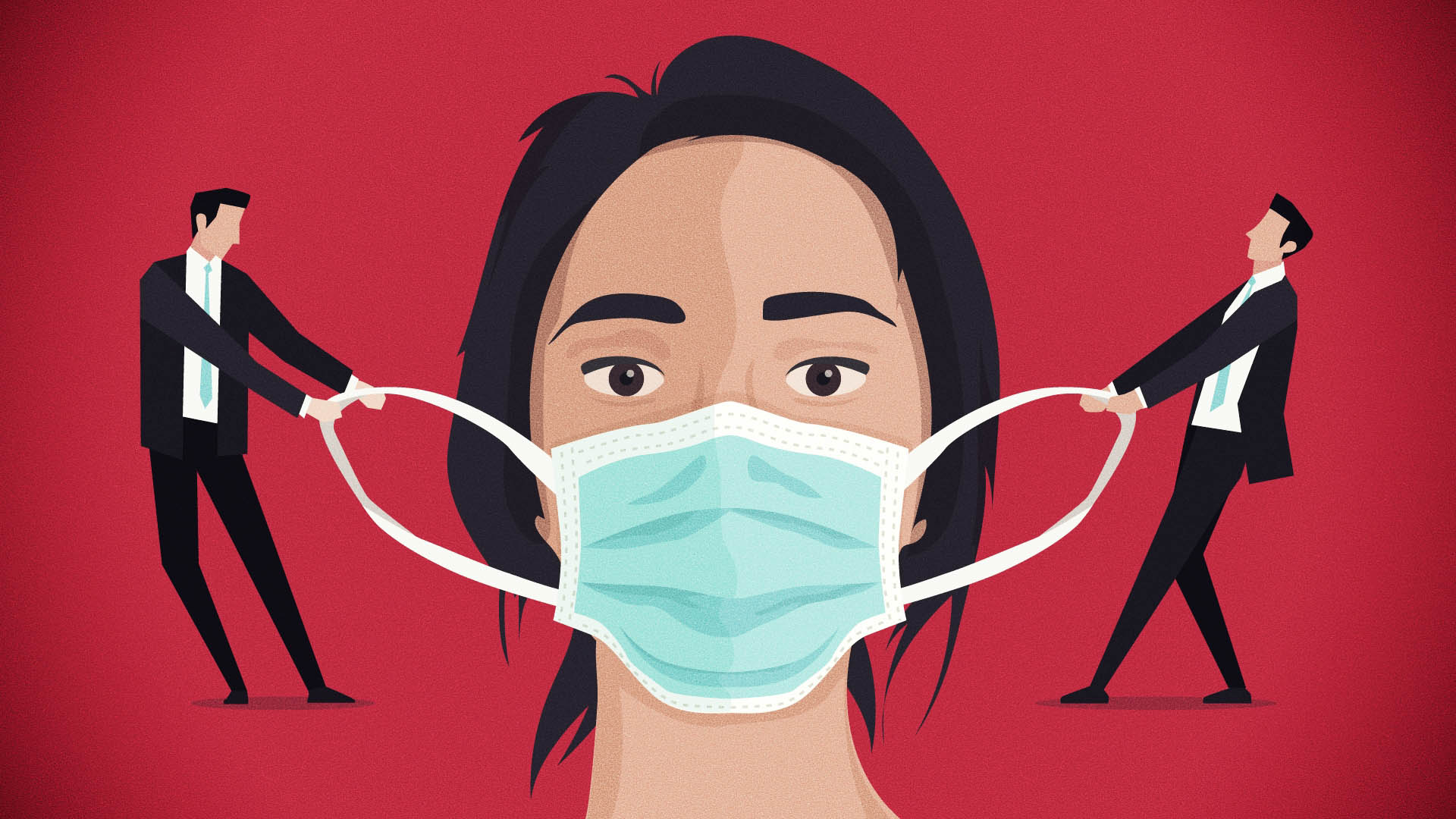Inside, pharmacists, wearing surgical gloves and masks, are busy behind the counter. No one enters the store; the entrance is blocked by a metal barrier. You (ok?) have to call out to the pharmacist inside to place an order, always from a safe distance. Many customers ask for masks, but it’s not sure they will find them.
Caught Unprepared
In an effort to avoid a second wave of the epidemic, Tunisian authorities have prioritized the production and distribution of masks in the State’s period of gradual deconfinement.
However, at the beginning of the health crisis, the government discouraged the population from buying masks. " The wearing of masks by healthy people is useless," said Chokri Hamouda, then Director General of Basic Health at the Ministry of Health, on February 26, 2020. He advised citizens against buying masks if they did not show any flu-like symptoms.
Following his remarks, on March 1st, Khalil Ammous, CEO of the Tunis Central Pharmacy (PCT), also advised " not to buy masks without a valid reason, to avoid any possible disruption in the supply." The following day, the Director General of the National Observatory of New and Emerging Diseases (ONMNE), Nissaf Ben Alaya, supported Chokri Hamouda's remarks, saying that the masks " were only effective for the sick."
" At the time, this position was normal," said Chedly Fendri, President of the National Council of Tunis Pharmacists (CNOPT). Given the contagious nature of the virus, "all world leaders changed their minds as the disease progressed," he says.
However, other countries and regions, particularly in Southeast Asia, took a different approach and quickly advocated for or even imposed the use of masks. Hong Kong, which followed this policy, has recorded only four deaths since the beginning of the epidemic. This rule, coupled with other social distancing measures, including the active surveillance of confirmed or suspected cases, has helped control the spread of the disease.
In Tunisia, the government’s initial strategy was to limit the arrival of the virus to the territory by establishing, among others, a policy of monitoring people coming from abroad, isolating suspected cases, and tracking the case’s network. A few weeks later, the government decided to impose a policy of self-confinement on the entire population.
Masks were not a priority at the time, and stocks in pharmacies were slow to arrive. When the first cases of COVID-19 were announced, demand increased and prices soared, partly due to the saturation of the international market. " Before the epidemic, masks were not sold. We had a few boxes in reserve, because only a few patients had bought them to protect their relatives in case they have the flu," says Malek Mekni of Tunisia's pharmacists' union (SPOT).
" Everybody was caught off guard and our capacity to produce masks didn’t meet our needs," explains Chedly Fendri of the CNOPT.
" In Tunisia, we only have a few production units for single-use masks. This is normally sufficient for our usual needs, which are mainly clinical."
In anticipation of possible pandemics, several countries have decided to build up reserves of protective gear for their populations. This is the strategy adopted in France, for example, where the government has been blamed for poorly managing the reserves. In Tunisia, where the supply of masks is usually sufficient, no representative has mentioned the existence of reserves kept in the case of a health crisis. Inkyfada contacted the Central Pharmacy and the National Observatory of New and Emerging Diseases (OMNME) for information on this subject, but they did not provide any further details.
Several statements from medical personnel spoke to a deplorable lack of masks and other protective equipment during this epidemic. As of May 11, out of a total of 1,032 confirmed cases of COVID-19, 143 patients were healthcare workers. Despite this figure, Malek Mekni states that " there was no real shortage of masks in hospitals or clinics. Healthcare personnel were well protected.” According to him, " because the masks were kept for the healthcare workers, there was little protection left for the population."
" Instead, the shortage affected the general public.”
Since February, the authorities have not spoken of the country’s stock of surgical or FFP2* masks. According to Chedly Fendri, approximately 25 million surgical masks and 1 million FFP2* masks for caregivers were ordered from China and arrived at the Central Pharmacy in April. When contacted by Inkyfada, the Central Pharmacy in Tunis (PCT) did not provide further details and did not respond to requests for interviews.
SUSPICIONS OF CORRUPTION
In April, the authorities begin to define a policy around masks and manage their circulation. It is announced that wearing masks after confinement will be mandatory. A plan to produce fabric masks - i.e. washable and reusable - is launched. The aim is to produce 30 million masks for the general public at a fixed price of 1.850 dinars each.
The decision to produce masks for the general public goes against the authorities’ initial recommendations. Given that the first measures against the epidemic were taken as early as the end of January and that the first positive case was discovered on March 2nd, it took more than a month to launch a mass production.
In the meantime, the authorities used a case of suspected corruption to justify a further delay. Soon after the government authorized and encouraged more companies to manufacture personal protective equipment, the Ortho-Group company was contacted to manufacture an initial batch of two million washable masks for a price of 3.8 million dinars. The company is owned by Jalel Zayati, a member of parliament (the ARP) with the el-Badil Ettounsi party.
On the basis of Article 25 of the ARP’s Rules of Procedure, which stipulates that " no member of the Assembly of People's Representatives shall conclude commercial contracts with the State, public authorities or public institutions and enterprises," the National Anti-Corruption Authority (INLUCC) decided to bring this case of suspected corruption to justice.
The arrangement would also constitute a conflict of interest according to the 2018 Act on the Declaration of Assets and Interests, Combating Illicit Enrichment and Conflicts of Interest. " Conflict of interest has been considered a form of corruption since the whistleblower law," said Charfeddine Yakoubi, former president of the Tunisian Association of Public Controllers (ATCP).
" Even though the government has asked for the distribution of fabric masks to be sped up (...), the procedures for public procurement have not been respected! We have a decree dating from 2014 that allows the use of emergency measures without taking into account the usual deadlines but while respecting the Constitution's rules of transparency and governance," he continues.
Salah Ben Youssef, the Minister of Industry, stated at a press conference that he did not know that the selected company was owned by member of parliament Jalel Zayati. " Maybe [Youssef] did not know, considering that he was recently appointed, but that cannot excuse him," said Charfeddine Yakoubi. " He has a lot of advisers, there is a whole department in the Ministry of Industry which is in charge of the textile field, we are talking about one of the biggest producers of masks in Tunisia."
However, Head of Government Elyes Fakhfakh, defended his minister, saying that he " had made an effort and done what was asked of him." He justified this non-compliance on the grounds that " the war context" required " urgent measures" to avoid " bureaucratic procedures" and to get production started.
In light of the controversy, Jalel Zayati's company did not receive the contract; Charfeddine Yakoubi is not sure that the lawsuit will go any further.
But he remains concerned about " other similar cases posing real transparency problems" and considers that " questions of conflicts of interest must be dealt with in greater depth."
In the General Authority for the Control of Public Expenditure’s response to this case of potential corruption, it is stated that " several overruns and shortcomings punctuated the operation of making barrier masks."
For Charfeddine Yakoubi, the case of Jalel Zayati is far from being isolated during this health crisis. " There are many other members of parliament who have contracts with the State. Some have drug manufacturing companies, others have contracts with the Ministry of Health, or consulting contracts..." The only difference, he said, is that they have not been called out by the INLUCC. Contacted on several occasions, the organization did not follow up on requests for interviews.
According to Abdelkarim Hamdaoui, who currently works (in detachment from the Ministry of Industry) as the head controller for the General Authority for the Control of Public Services under the office of the Presidency, this case was blown out of proportion.
" I've been a public controller for 20 years, if there was the slightest suspicion of corruption, I wouldn't be defending them. The Minister is not the one who ordered the spending to make this deal happen," says the public controller impatiently.
Abdelkarim Hamdaoui says that no contract was signed, but that there was talk of contacting several companies capable of producing 2 million masks urgently, and subsequently 30 million more in the following weeks.
" Instead of working on urgent files, many of them related to mask production, I find myself preparing a file for the parliamentary committee and answering questions from the Control Authority," he adds. " It's been a waste of time, but it's not true that it has delayed production, since there was no deal made at the outset," he insists.
He also says that the Ministry contacted the company, not the MP, directly and says it was only after the media picked up the story that it became known that the company was linked to the MP. On his end, Jalel Zayati apologized for having violated the provisions of the Assembly's Rules of Procedure.
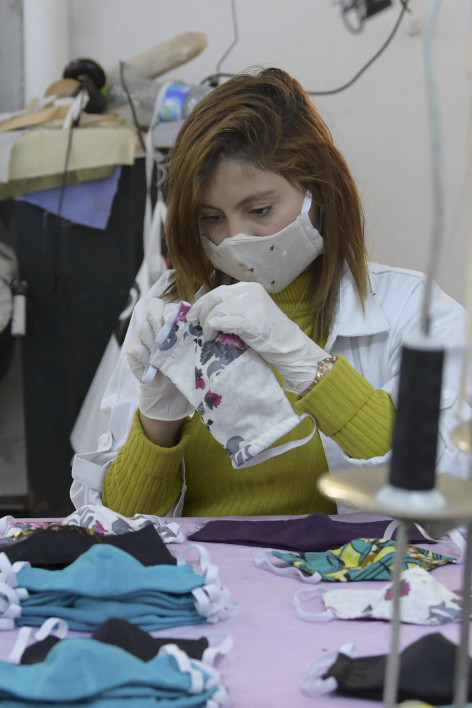
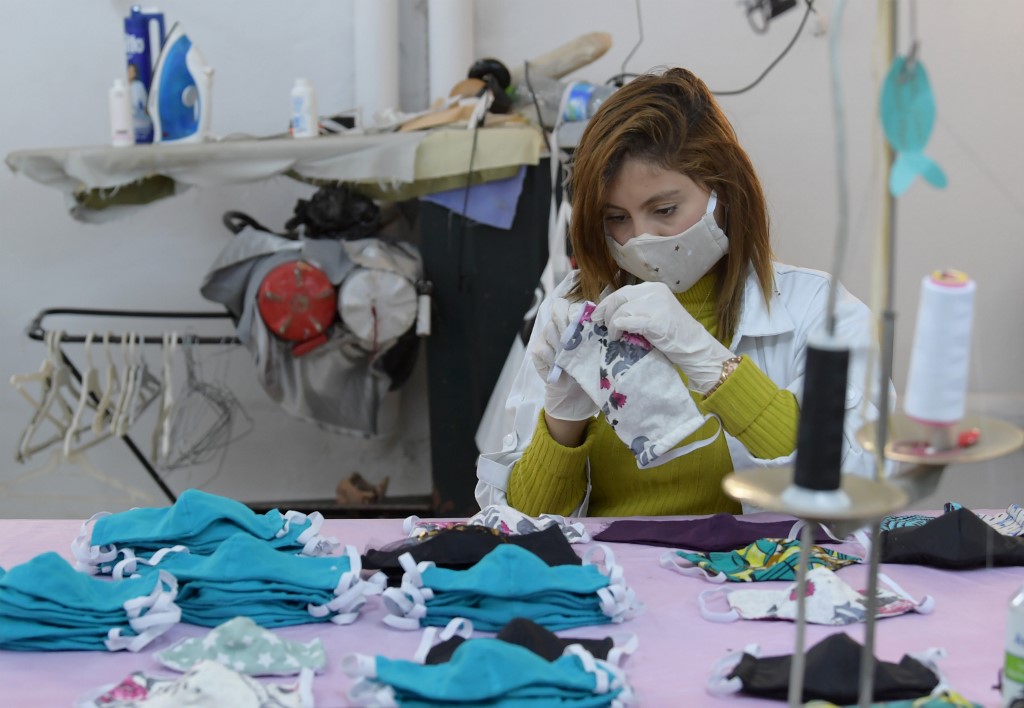
A seamstress makes protective masks. Credit: Fethi Belaid/AFP
Frequent delays in production
At the end of April, Chiheb Ben Rayana, the director of the National Drug Control Laboratory (NDCL), estimated that 20 to 25% of the 30 million masks announced would be available in pharmacies by the start of the deconfinement period. Neither the Central Pharmacy nor the Ministry of Health’s S.H.O.C. Room responded to our requests for interviews regarding existing stocks.
There are nearly 1,200 textile companies in Tunisia, according to the representative of the Tunisian Federation of Textiles and Clothing (FTTH). In theory, this should make it possible to quickly produce a sufficient quantity of reusable masks for the entire population. However, 82% of these companies are offshore: their goods are mainly intended for export. However, with this status, they are technically able to sell up to 50% of their stock locally.
Slim Jamoussi, Director General of the Technical Center for Textiles in Tunisia (CETTEX), the authority responsible for controlling masks, is counting on the possibility of increasing the number of reusable masks on the market. " All these companies have benefited from the ‘upgrading program,’ the support of the Tunisian State ... It's time to return the favor."
However, several of these companies are already exporting what they produce. " Many of them import fabrics from France or elsewhere and are already manufacturing masks for Europe, France... It's a subcontracting relationship," says Chiheb Ben Rayana of the National Drug Control Laboratory (LNCM).
Also at the end of April, the Ministry of Industry launched a website calling for companies manufacturing personal protective equipment (PPE) to register and sell their products online. But as of May 12, fewer than forty companies had registered. The " online shop" indicates a production capacity of around one million masks per week but, according to the information available, no " orders" have been placed via the platform.
According to Abdelkarim Hamdaoui, senior controller at the Ministry, this platform does not provide an exact indication of the number of companies currently producing the necessary equipment, nor of the country's production capacity. The controller also did not give a precise figure, indicating that he himself does not know this production capacity.
The FTTH was contacted on numerous occasions and did not respond to requests for interviews concerning the number of resident or non-resident companies currently producing masks for the local market.
Waiting for approval
In addition to these difficulties, several people point to long approval procedures that further delay production. Ahmed*, who owns a textile manufacturing company, has been waiting for an approval from the authorities for almost 3 weeks, "like many others." " Normally, the washing and mask verification tests are supposed to take five days," he says.
The head of the company is confident that the masks he has manufactured are compliant, assuring that he has followed all the internationally-established procedures. " My fabric importer is up to standard and I'm a former laboratory agent, I've already conducted verification tests." For him, these " bureaucratic" procedures slow down production at a time of " very high demand."
Before distributing their products, companies must first be certified by the CETTEX, the center responsible for mask quality control, by submitting a file and providing a prototype to be tested. A second check is carried out when the products are delivered.
" These are products appearing for the first time and therefore there is no real standard," explains Chiheb Ben Rayana of the National Drug Control Laboratory (LNCM).
In collaboration with the CETTEX and the PCT, the Laboratory has drawn up specifications for mask quality based on the recommendations of the French Standards Association (AFNOR). The recommendations can be summed up in two essential criteria: the masks do not hinder breathing and act as an effective barrier to particles less than 3 micrometers (µm) in diameter.
Despite the fact that institutions are prioritizing files related to COVID-19, these verification steps can take time. By the end of April, nearly 50 files for approval were still blocked at the control center. " But once they get started, they’re done quickly," says Slim Jamoussi, Director General of the CETTEX.
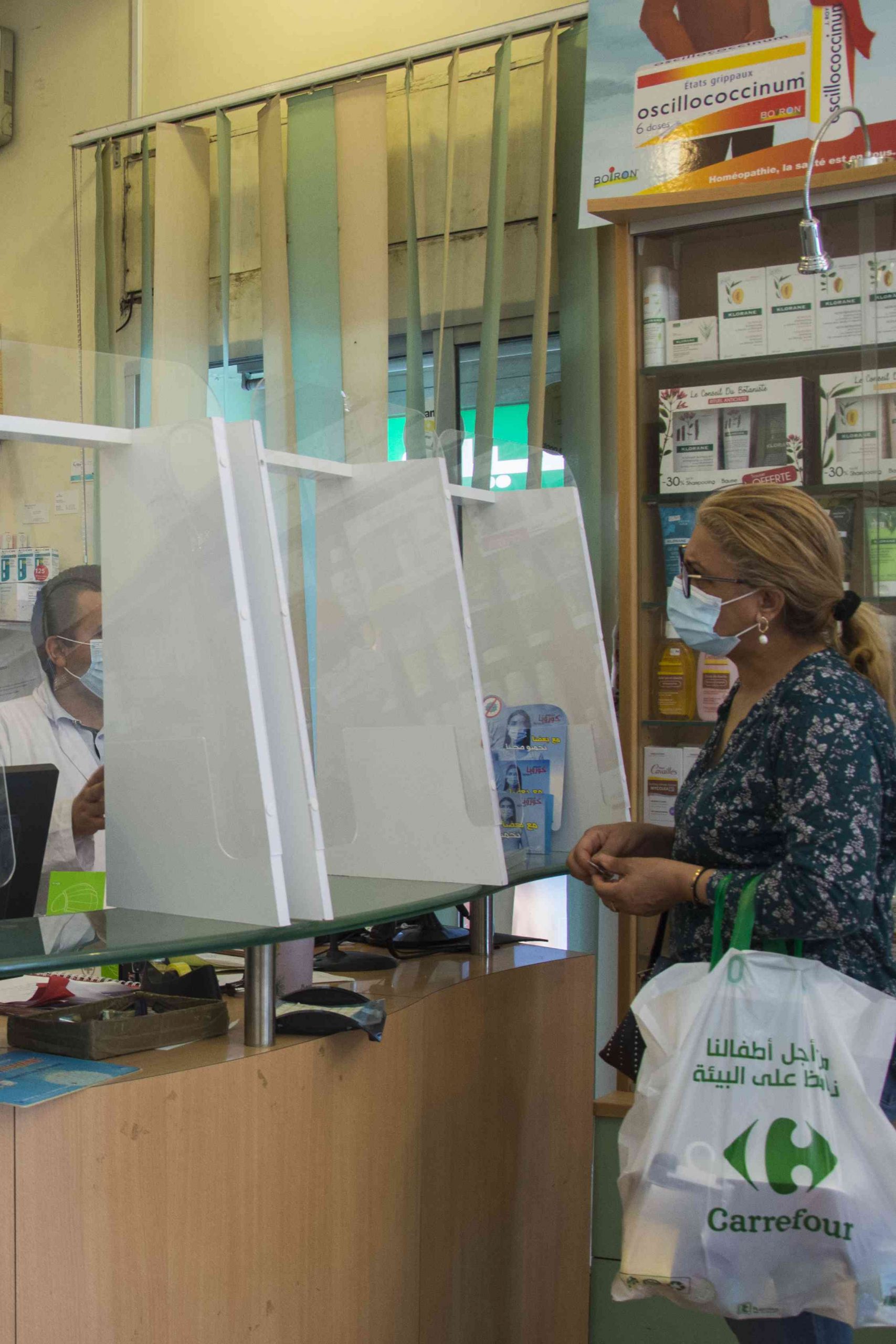
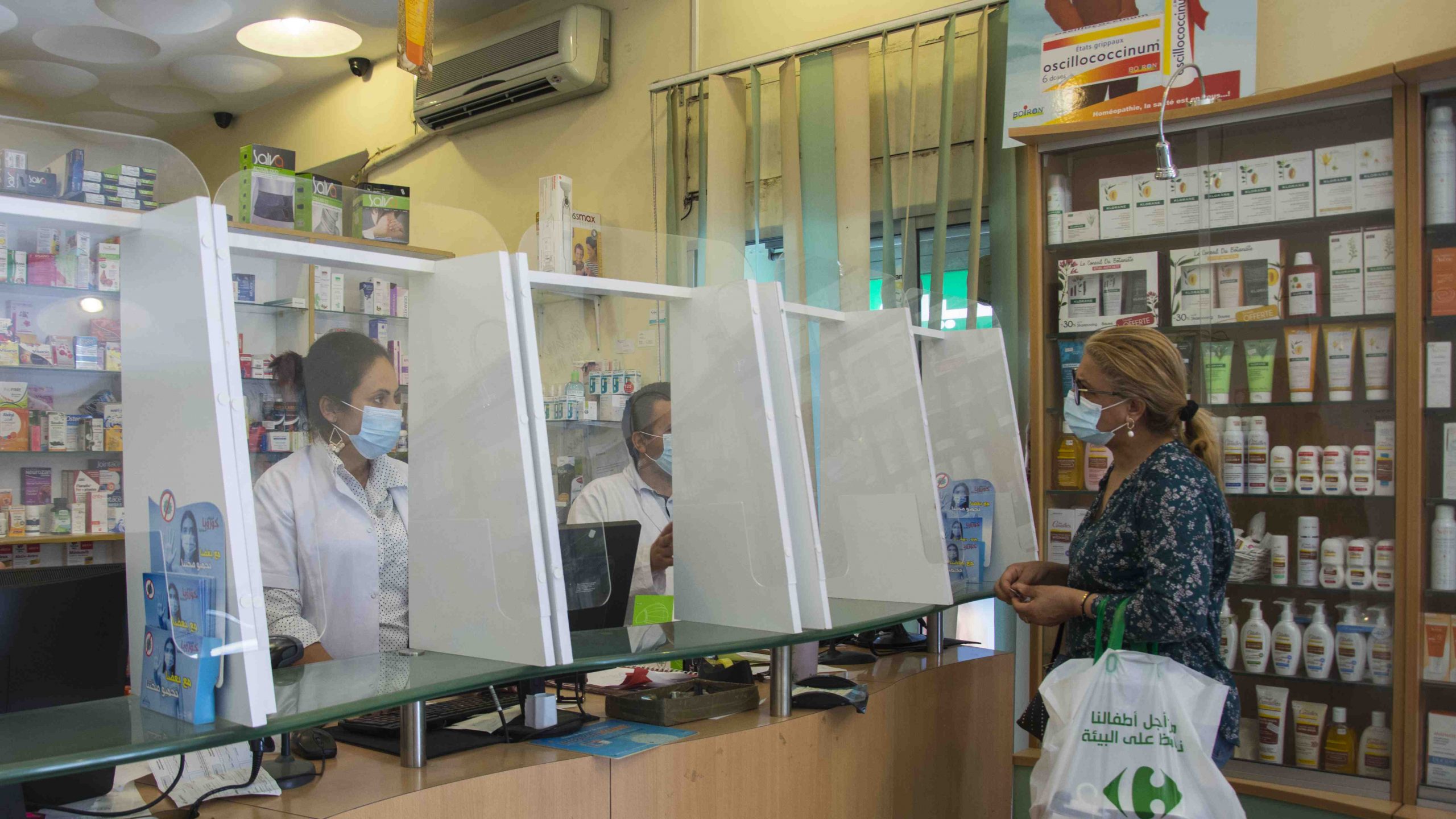
In a pharmacy in downtown Tunis, employees have installed Plexiglas protection to avoid being in contact with customers.
INSUFFICIENT STOCKS FOR DECONFINEMENT
When deconfinement began on May 4, reusable masks were already becoming scarce in pharmacies. " Many manufacturers have not yet been certified, so there are not enough reusable masks on the market," explains Malek Makni of the pharmacists’ union SPOT.
The provision of masks has started, but for the moment " it's not enough to cover all pharmacies."
Aya*, a pharmacist in Greater Tunis, received masks for the beginning of the deconfinement period, however, they were not the fabric type that had been promised by the government. Her pharmacy received surgical masks, which should normally be reserved for healthcare workers. According to the authorities' guidelines, Aya can sell a maximum of 5 masks per person, at 500 millimes per piece.
" With all the controversy around the market, the strategy changes, and the production delays, the government is now obliged to release part of the stock of single-use masks," says Chedly Fendri of the CNOPT. " Starting Sunday, May 3rd, 5 million surgical masks were released and distributed among wholesalers to await the arrival of cloth masks." But he reassures that medical staff will still have access to the supplies they need. " This is a provisional and one-time release," he insists.
The government’s provisioning has not prevented the appearance of multiple types of fabric masks on the market in recent weeks. " Some people sell masks claiming they are up to standard. Some probably are, but I don't think the majority are. And because they weren't really available in pharmacies, people fell back on this parallel supply chain," says Makni.
Some pharmacies sell fabric masks that have not been approved by the State. They may be up to standard if the manufacturers followed international manufacturing recommendations, but their price does not correspond to the price set by the authorities (1.850 dinars). " There are pharmacists who still think it's a free price or others who have been unable to buy below the certified price. Or there’s a pharmacist taking advantage of the system and selling at a higher price. You see everything," says Malek Makni.
Rihab*, who works in a drugstore in Bizerte, was unable to obtain medical equipment from the Central Pharmacy " despite constant announcements from the State," so she turned to manufacturers who sold her the products at a higher price. Several seamstresses also offered her their services, but she refused, fearing that their masks were not up to standard.
Ahmed, the head of the textile company, admits that he has already taken the initiative to sell some samples of his fabric masks. He assures that he has respected the announced price, even if he does not yet have his certification.
" We have asked pharmacists to wait until the procedure is clear, but in the meantime, there is a strong demand," says Chedly Fendri of the CNOPT.
According to him, the procedure " is becoming clearer" and is starting to lighten. " International certifications are going to be recognized, it will be possible to subcontract to laboratories approved by the CETTEX, etc. We are in the process of making it more flexible in order to have them as quickly as possible."
Chedly Fendri would like to point out that even if standards are being established, washable masks are not intended for medical use. " Unlike the FFP2 mask, and to some extent the surgical mask, the fabric mask mainly protects others." It can still have a slightly protective effect on healthy people, but it is mainly the contaminated individuals who reduce their contagion capacity by equipping themselves in this way. " It's the synergy of both groups wearing the mask," he concludes.
Everyone now agrees that wearing a mask or " even a piece of cloth," protects more than not wearing one at all, but this consensus was far from being reached at the beginning of the epidemic.
